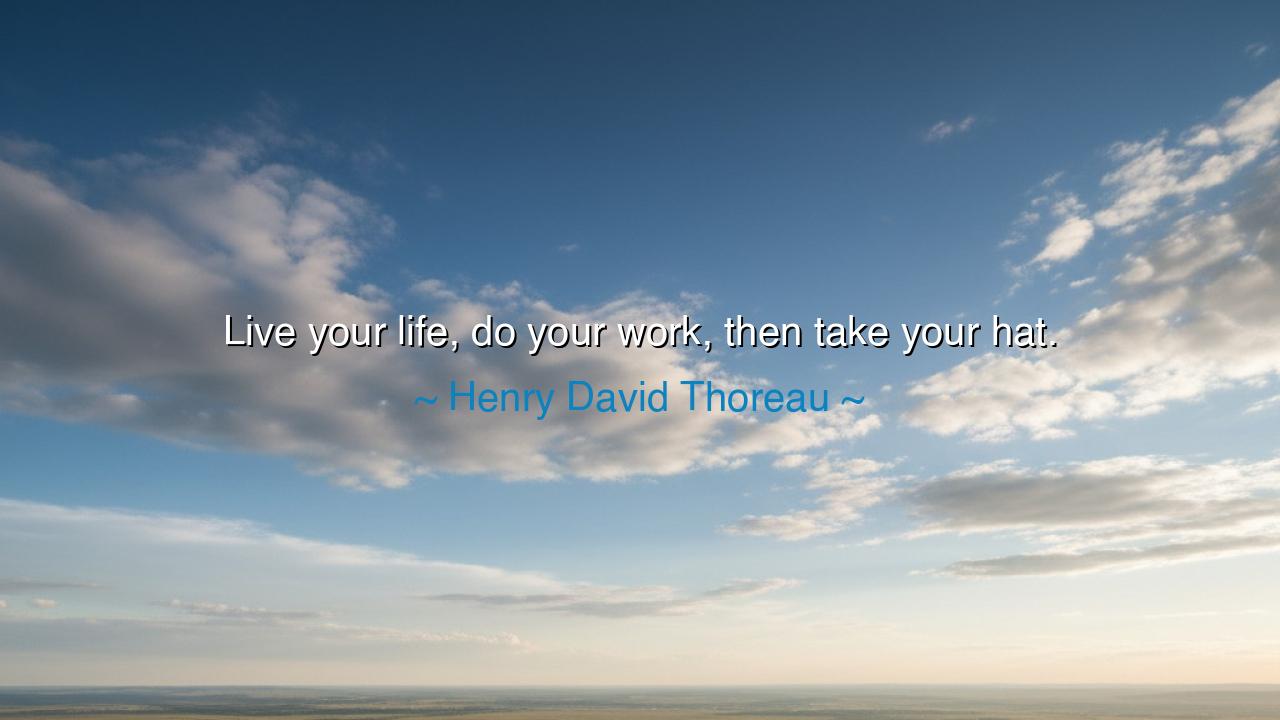
Live your life, do your work, then take your hat.






Mark well these words of Henry David Thoreau, seeker of truth and dweller by the quiet waters of Walden. He speaks with the simplicity of the ancients: Live your life, do your work, then take your hat. In these few syllables lies a teaching vast as the heavens, for he summons us to a life of presence, duty, and graceful departure.
To live your life is to breathe fully, to drink of the moments given, and to walk not as a shadow among men but as one awake to the song of the world. It is to cherish the dawn, to taste both joy and sorrow, and to weave from them the garment of existence. Thoreau bids us first to be, to claim the gift of life without fear or delay.
To do your work is to honor the labors set before thee. Not merely the tasks of the hands, but the calling of the soul. Each man and woman is given a duty, whether small or great, and to fulfill it with steadfast heart is the noblest offering. In this, Thoreau echoes the wisdom of the ancients: that work is not bondage, but a path toward meaning, discipline, and harmony with the eternal order.
And when the day is finished, he says, take your hat. Depart with dignity, neither clinging to what has passed nor fearing what lies beyond. For life itself is but a sojourn, a brief stay at the inn of the earth. To leave with peace in the heart and the hat in hand is to embrace the natural cycle: arrival, duty, and departure.
Thus, children of tomorrow, learn this: life asks not for grand speeches, but for simple faithfulness. Live, labor, and leave—with no regret, no excess, and no delay. This is the wisdom of Thoreau, and through it, the timeless voice of all who sought truth before him.






1NPhuong Anh 1-7a2 Nguyen
Thoreau’s quote brings to mind the idea of living with intention and simplicity. It sounds like he’s advocating for a life where you focus on what truly matters—living authentically and doing your best work, and then letting go when it’s time. But how do we make this mindset a reality? In a world that constantly urges us to push harder and do more, how can we practice the art of simply living and working, and then stepping away without guilt?
THT.Nguyen Haanh
This quote by Thoreau seems to challenge the constant need for validation or recognition. It’s almost as if he’s saying, ‘Do the work, but don’t get too attached to it or to the accolades that come from it.’ How much of our own identity do we tie to our work and achievements? Is it possible to separate our worth from the outcomes of our efforts, as Thoreau suggests, or is this a more difficult concept to embrace in modern times?
Y139 - Nguyen Thi Nhu Y 12a2
Thoreau’s quote has a kind of poetic elegance about it. The idea of living your life and doing your work, then simply taking your hat, suggests that we should approach life with humility and detachment. But how realistic is this advice in today’s world, where success is often measured by constant achievement? Can we truly live this way, or is it something we can only strive for, but never fully achieve in our busy, achievement-driven culture?
NTPhuong Thao Nguyen Thi
I really like the simplicity and clarity of Thoreau’s words. It feels like a reminder to stop overthinking and just get on with living and working. Is there value in focusing less on expectations and more on the process itself? It also makes me wonder: in a world where hustle culture dominates, can we still find peace in doing our work and then stepping back, without feeling the pressure to always be striving for more?
TANguyen Hai Thien An
Thoreau’s quote suggests a kind of quiet confidence in living life without getting overly attached to outcomes. It makes me wonder: how often do we hold on too tightly to the idea of success, rather than just living and doing what we love? Does this approach make life less stressful, or does it take a certain level of discipline to embrace it fully? How do we cultivate the balance between work and detachment?